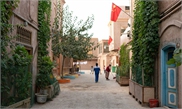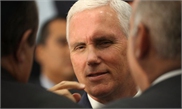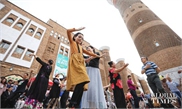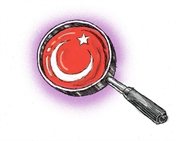White Paper sets Xinjiang facts straight
The State Council Information Office published on Sunday a White Paper, clarifying certain misunderstandings about Xinjiang's ethnic, religious, cultural and historical issues in the international community. With the paper, kind-hearted people can distinguish between right and wrong. It is hoped malicious agitators will zip their lip.
US insults the world with Pence, Pompeo lies about Xinjiang
China's human rights cannot advance without peace and development. Pence and Pompeo are talking nonsense. The international society is much smarter than what they think.
22 nations biased on governance of Xinjiang
The West cannot represent the world. The West should do some self-examination for being exclusive and setting themselves against vast number of developing countries.
Xinjiang's prosperity driven by China's strength
Those Western forces who have long accused Xinjiang of improper governance should re-examine their consciences.
China's anti-terrorism experience in Xinjiang useful to UN
Counter-terrorism is a global challenge. The situation in Xinjiang has fundamentally improved with a large amount of work but relatively small social cost.
Hollow claims by US on caring about Chinese human rights
US Secretary of State Mike Pompeo made a statement on Monday in which he accused China of "abusing human rights" and smeared China's resolute measures to maintain national stability in the late 1980s. He also criticized China's governance in the Xinjiang Uyghur Autonomous Region. The US has stepped up its attacks on China on human rights issues simply because Washington's trade war with China is proving to be invalid. Now, the US has decided to impose more pressure on China over human rights issues.
Xinjiang must maintain long-term stability
Xinjiang may not need to set the level of social security higher than other parts of the country. But it must stay basically stable and resolutely avoid large-scale terrorist activities that occurred in previous years. This will be the key indicator for a final evaluation of Xinjiang's governance outcomes at this stage.
Economic growth can never be split from security
The news is saddening: coordinated bombings in Sri Lanka caused great casualties on Easter Sunday. The explosions not only shocked the world but reminded people to contain the spread of extremism to safeguard public security, which should be continuously strengthened with economic and social development in areas including China's Xinjiang Uyghur Autonomous Region.
China's actions to sinicize religions rational and lawful
The vocational education and training centers in Xinjiang are part of China's efforts in religious sinicization. They help trainees get rid of extreme thoughts and learn to integrate into the country's development.
US in no position to criticize China's religious policy
Instead of criticizing China's domestic affairs, Washington should just mind its own business. All in all, the US shouldn't always play the missionary's role and force its faith on others.
Fight against extremism in Xinjiang includes improving lives of residents
Faced with the severe challenges of terrorism and extremism, no country can shy away from dealing with them. Only by strengthening our community of shared future and promoting exchanges and cooperation, can we effectively curb and combat terrorism and extremism in the interests of world peace and stability.
Language and vocational training provide Xinjiang with long-term poverty relief
Poverty reduction in Northwest China's Xinjiang Uyghur Autonomous Region was highlighted during the ongoing annual sessions of the 13th National People's Congress and the 13th National Committee of the Chinese People's Political Consultative Conference. Putonghua and vocational training as poverty reduction measures have helped address career disadvantages among ethnic minorities in Xinjiang by providing more opportunities to embrace economic development. These efforts help lift the barriers between ethnic groups and prevent marginalization, a hotbed for breeding terrorism and extremism.
Turkey should shed blinkers on Xinjiang
As Turkey continues to look Eastward amid strained relations with the West, China's peaceful rise and its Belt and Road initiative both provide Turkey an opportunity for healthy development. Turkey would be much better off if it focused on its strategic partnership with China while trying to gain realistic understanding of the Xinjiang issue, avoiding its Muslim leadership aspirations being misused.
Turkey in no position to judge Xinjiang
To stabilize Xinjiang is the core matter of Xinjiang governance, no matter what the outside world says. A prosperous and dynamic Xinjiang is the best answer to external accusations.




